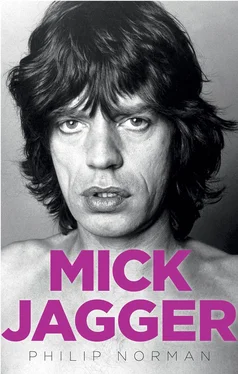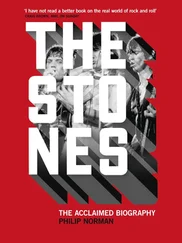Oldham writes in Stoned that during this period he and Mick were ‘as close as two young men could probably become’ – and there has been endless speculation ever since about the extent of that closeness. Oldham certainly was not homosexual – indeed, had lately begun going out with a Hampstead girl named Sheila Klein (a surname to have large resonance in another context later in this story) whom he was soon to marry. At the same time, with his homing spirit for all outrage, he sought out the company of notable gay men in the music business – in particular the composer of Oliver! , Lionel Bart – and added their gestures and speech mannerisms to his repertoire of devices for amusing his friends and disconcerting his foes.
At all events, rumours began to fly around that in the extremely crowded quarters of 33 Mapesbury Road Mick and Oldham’s closeness extended to sharing the same bed. One must hasten to add that, in purer-minded 1964, that did not necessarily signify what it would today. Young men could still have platonic friendships in the Victorian mode, sharing flats, rooms and even beds (as pop band members often did on tour) without the slightest homoerotic overtones. Oldham’s own memoirs recall a night when the two of them ended up at his mother’s flat in Netherhall Gardens, Hampstead, and, rather than struggle home to Willesden, decided to crash out there. When Mrs Oldham looked into his room the next afternoon, she found them both squeezed into his single bed, still dead to the world.
According to Chrissie, Oldham’s soon-to-be fiancée, Sheila Klein, was also vexed by these rumours and – on a different occasion, at Mapesbury Road – suggested that the two of them should investigate for themselves. ‘[Sheila] got me to wait all night with her to see if Andrew and Mick slept in the same bed and they did . . . We found them asleep, facing the same way, and I can remember thinking how sweet they looked. Sheila said, “There, I knew they were!” and I still didn’t know what she meant.’
ON 7 FEBRUARY 1964 the Beatles had crossed the Atlantic for the first time, touching down in New York amid scenes of juvenile hysteria that made European Beatlemania seem muted by comparison and ending American dominance of pop music with a single appearance on the nationwide Ed Sullivan TV show. They were Britain’s most successful export since Shakespeare and Scotch whisky, ambassadors of seemingly boundless charm and good manners whose once-controversial hair was now regarded back home as a precious national asset. During a reception for them in Washington, DC, a woman guest produced some nail scissors and playfully snipped a lock or two from the back of Ringo Starr’s neck. For the attendant British media, it was an outrage tantamount to defacing the Crown Jewels.
While the Beatles conquered America, the Rolling Stones had to be content with conquering the American act meant to have headlined their second UK package tour. This was Phil Spector’s black female vocal trio the Ronettes, whose tumultuous ‘Be My Baby’ was a UK hit single currently far outselling ‘I Wanna Be Your Man’. They were also sexy in a way no female pop group had ever been, with their beehive hair, brazen eye makeup and slinky, chiffon-sleeved trouser suits. Even that could not save them from the same fate as the Everly Brothers, two months previously. Before the tour even began, the Stones replaced them as top of the bill.
Spector, the trio’s manager as well as record producer, was already fixated on lead singer Veronica – ‘Ronnie’ – Bennett (whom he would later subject to a gothic horror story of a marriage). Having received an advance character sketch of the top three Stones from his would-be British counterpart, Andrew Oldham, he sent them a stern collective telegram saying ‘Leave my girls alone’. This did not stop both Mick and Keith from making a beeline for Ronnie’s beehive at a party at deejay Tony Hall’s Mayfair flat which John Lennon and George Harrison also attended on the eve of their departure for America. Boyfriend magazine’s correspondent, Maureen O’Grady, remembers the atypical tension between the Dartford chums as they competed for Ronnie’s attention, and Mick’s sulky pique when she proved immune to his charms and went off with Beatle George.
With ‘I Wanna Be Your Man’ barely out of the Top 10, the insatiable pop music machine was already slavering for a third Rolling Stones single. And this time there would be no friendly Beatles to help out. Instead, the Stones looked beyond the over-ransacked R&B back catalogue to the one white American performer who counted as an equal influence on them all. The unanimous choice was ‘Not Fade Away’, the B-side to Buddy Holly’s 1957 hit ‘Oh Boy’, which Mick had seen Holly play live at the Woolwich Granada cinema during the one British tour he managed before his premature death. Serendipitously, the Stones–Ronettes show would appear at the same venue.
‘Not Fade Away’ was recorded at Regent Sound Studios during a brief interlude between early tour dates. To lighten an initially rather tired, grumpy atmosphere, Oldham turned the session into a booze-fuelled party, inviting various other pop personalities along to lend a hand. The American singer Gene Pitney, a former PR client of Oldham’s, contributed extra percussion and an outsize bottle of cognac. Graham Nash and Allan Clarke of the (highly appropriate) Hollies dropped by to watch while the great Phil Spector, who had formerly produced Pitney’s records, shook maracas.
Buddy Holly and the Crickets’ ‘Not Fade Away’ had been an almost hymn-like chant of a cappella voices, whose only beat was drumsticks tapping on a cardboard box. But the Stones’ cover version was as full-on and aggressive as ‘I Wanna Be Your Man’, with Keith’s rhythm guitar turned up to maximum for the first – but not last – time in the staccato, seesaw beat invented by their late tour companion Bo Diddley. Mick’s vocal made no attempt to replicate Holly’s subtlety and charm, but stuck to the same snarling sexual challenge as before. In counterpoint to Keith’s rhythm-led chords, Brian supplied a throbbing harmonica bottom line that made the others, temporarily, forgive him everything. The result might not exactly be a Wall of Sound on the Phil Spector level, Andrew Oldham commented, but it certainly was a Wall of Noise.
With nothing to put on the B-side, and tipsiness now firmly in control, Spector and Mick together cobbled up a song called ‘Little by Little’, an outright copy of Jimmy Reed’s ‘Shame Shame Shame’. At a later session, two further tracks were put on tape, both obviously unreleasable for commercial purposes. ‘And Mr Spector and Mr Pitney Came Too’ was a free-for-all instrumental featuring a wicked Mick take-off of Decca Records’ elderly boss Sir Edward Lewis. ‘Andrew’s Blues’ was a pornographic monologue by Phil Spector, dedicated to his British disciple-in-chief, featuring Allan Clarke and Graham Nash on back-up vocals.
When ‘Not Fade Away’ was released on 21 February few among the target audience even recognised it as a Buddy Holly homage. In its raw belligerence it seemed quintessentially Rolling Stones, which by now meant quintessentially Mick. For Jacqui Graham and her ilk, the accompanying vision was not of a bespectacled young Texan, dead too soon, but of ironic eyes and overstuffed, well-moistened lips slurring Holly’s original ‘A love for real will not fade away’ to a barely grammatical ‘Love is love and not fade away’; turning wistful hope into a sexual fait accompli . The single raced up every UK chart, peaking at No. 3, while Mick was still out on the road, upstaging, if not upending, Ronnie of the Ronettes.
With so many readers – or, at least, readers’ offspring – converted to the Stones, Britain’s national press now had to find something positive to say as well as recoiling like a Victorian maiden aunt from their hair and ‘dirtiness’. And the line from Fleet Street could not have been more perfect if Andrew Oldham had dictated it himself. ‘They look,’ said the Daily Express , ‘like boys whom any self-respecting mum would lock in the bathroom . . . five tough young London-based music-makers with doorstep mouths, pallid cheeks and unkempt hair . . . but now that the Beatles have registered with all age-groups, the Rolling Stones have taken over as the voice of the teens.’ Maureen Cleave of the London Evening Standard – who had been among the first national columnists to interview the Beatles – wrote about the Stones in a tone of repugnance more valuable than five-star adulation: ‘They’ve done terrible things to the music scene, set it back, I would say, about eight years . . . they’re a horrible-looking bunch, and Mick is indescribable.’
Читать дальше












